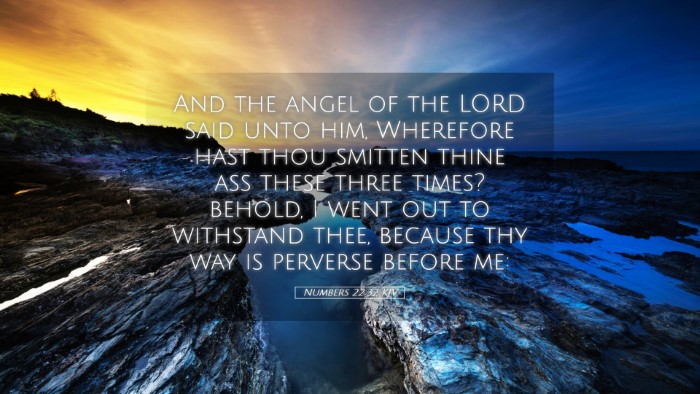Commentary on Numbers 22:32
In the fascinating narrative of Numbers 22, we find the significant encounter of Balaam, the prophet, with the angel of the Lord. Numbers 22:32 reads:
"And the angel of the Lord said unto him, Why hast thou smitten thine ass these three times? behold, I went out to withstand thee because thy way is perverse before me."
Contextual Analysis
The events surrounding this verse highlight the tension between divine sovereignty and human agency. Balaam, a non-Israelite prophet, is summoned by Balak, the king of Moab, to curse the Israelites. However, God’s intervention illustrates His authority and the futility of opposing His will. The narrative serves as a reminder to both leaders and believers about the importance of aligning one's actions with God's purposes.
Insights from Commentators
Matthew Henry's Commentary
Matthew Henry emphasizes the role of the "angel of the Lord" as a divine mediator. He observes that the angel appears to be an embodiment of God’s displeasure with Balaam's intentions. Henry points out that Balaam's behavior—smiting his ass—serves as a metaphor for man’s often misguided attempts to make decisions without divine wisdom. God’s rebuke through the angel illustrates the importance of heeding God’s direction.
Albert Barnes' Commentary
Albert Barnes notes the phrase "thy way is perverse before me." He stresses that Balaam’s motives were not pure; his desire for profit and personal gain clouded his judgment. Barnes suggests that God’s confrontation serves as a critical turning point. While Balaam was a prophet capable of speaking God’s words, his choices reveal the dangers of deviating from God's path for self-serving purposes. This passage warns contemporary readers about the consequences of having a heart inclined towards selfish ambition rather than true obedience to God’s will.
Adam Clarke's Commentary
Adam Clarke provides a deeper examination of the interaction between Balaam and the angel. He remarks on the symbolism of the donkey, which possessed the ability to see the angel when Balaam could not. Clarke emphasizes the irony in Balaam's treatment of the donkey, suggesting that sometimes those whom we regard as lesser or unworthy may perceive truths that we ourselves fail to notice. Furthermore, Clarke elaborates on the theological implications of divine restraint. The Lord was ready to stop Balaam, and the angel's appearance essentially served as a moment of grace to redirect the prophet back toward God's will.
Theological Implications
This verse has profound theological implications for understanding sin and divine intervention. It illustrates God's proactive involvement in human affairs. The angel functions as a divine counterpart to Balaam's misguided actions, emphasizing God’s sovereignty alongside human free will.
Human Responsibility
Balaam's character embodies the struggle between desire and duty. Despite his prophetic gifts, he represents the potential for human disobedience. This calls into question the responsibilities that come with spiritual authority. Believers are reminded that while they may possess spiritual gifts, it is vital to seek God’s guidance and be vigilant against the pitfalls of self-interest.
Divine Protection
The appearance of the angel serves as a protective measure for the Israelites. God ensures that His people remain unblemished despite external threats. This serves as an assurance that God actively defends His covenant people regardless of the plans of those who oppose Him.
Conclusion
Numbers 22:32 encapsulates a pivotal moment in biblical history, blending themes of divine intervention, human frailty, and the overarching sovereignty of God. As pastors, theologians, and students engage with this text, they are invited to ponder the implications of their own paths and priorities in relation to God's divine will. The message remains clear: God’s purpose prevails even in the face of human obstinacy.
In studying the interplay between Balaam and the angel, we are challenged to reflect on our choices and the accompanying consequences. Let this commentary stir an awakening to the complexities of guidance and the necessity of obedience to the divine will as we navigate our faith journeys.


